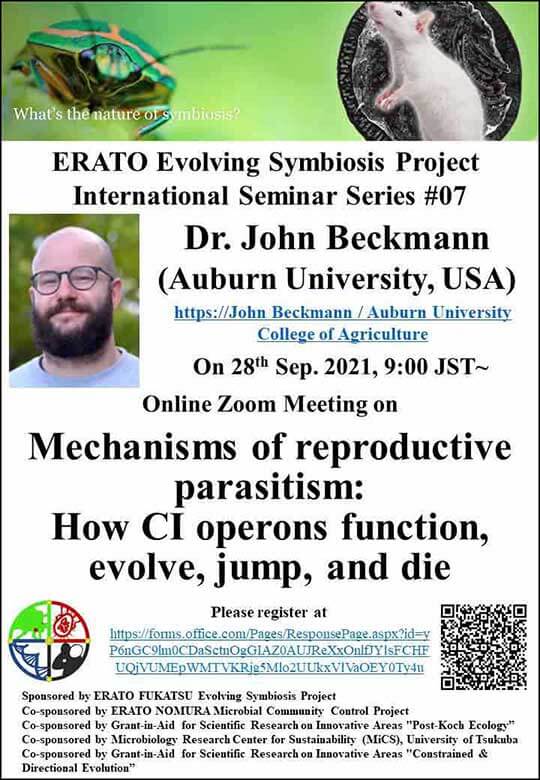第7回共生進化機構国際セミナーをオンライン開催しました。
共生細菌ボルバキアによる細胞質不和合の分子機構を世界に先駆けて解明したDr. John Beckmann(Auburn University, USA)にご講演いただきました。

Abstract:Wolbachia are obligate intracellular bacteria. They are the most common known insect endosymbiont. One cause of their abundance is reproductive manipulation. Wolbachia cause cytoplasmic incompatibility (CI). The CI phenotype was first observed in the 1930’s and characterized in the 1960’s. Recent discoveries have identified two gene operons that induce CI. The operons behave as a toxin antidote (TA) system. The toxin has either deubiquitylating or nuclease enzymatic domains that induce the CI phenotype; in some cases both enzyme domains are present. Recent proteomic studies have identified nuclear import factors (karyopherins) and protamine histone exchange chaperones (P32) as target substrates. The operons that induce CI have also been found in close sister bacteria Rickettsia and Orientia. In Rickettsia the operons appear on plasmids which suggests that CI evolved from a simple plasmid TA system. Furthermore, the operons are capable of horizontal gene transfer and have recently “jumped” into pathogenic Orientia tsutsugamushi. The Orientia operon is active when tested in transgenic Drosophila models. Notably, Trombiculid mite vectors exhibit Orientia dependent parthenogenesis. This observation suggests a new hypothesis that parthenogenesis induction and CI might share a common mechanistic foundation, built upon these operons. Finally, evolutionary theory predicts that selection does not maintain these operons, once fixed in a population. However, they persist in nature by “jumping” to new organisms. Operons that do not jump eventually pseudogenize by N-terminal deletions in the toxin gene and/or mutations reducing toxin enzymatic efficiency.
ERATO Evolving Symbiosis Project International Seminar Series #07
第7回共生進化機構国際セミナー
Sponsored by ERATO FUKATSU Evolving Symbiosis Project
主催:ERATO深津共生進化機構プロジェクト
https://www.jst.go.jp/erato/fukatsu/
Co-sponsored by ERATO NOMURA Microbial Community Control Project
共催:ERATO野村集団微生物制御プロジェクト
https://www.jst.go.jp/erato/nomura/
Co-sponsored by Grant-in-Aid for Scientific Research on Innovative Areas "Post-Koch Ecology”
共催:新学術領域研究「ポストコッホ生態」
https://postkoch.jp/about/
Co-sponsored by Microbiology Research Center for Sustainability (MiCS), University of Tsukuba
共催:筑波大学微生物サステイナビリティ研究センター(MiCS)
https://www.mics.tsukuba.ac.jp/
Co-sponsored by Grant-in-Aid for Scientific Research on Innovative Areas "Constrained & Directional Evolution”
共催:新学術領域研究「進化制約方向性」
http://constrained-evo.org/


